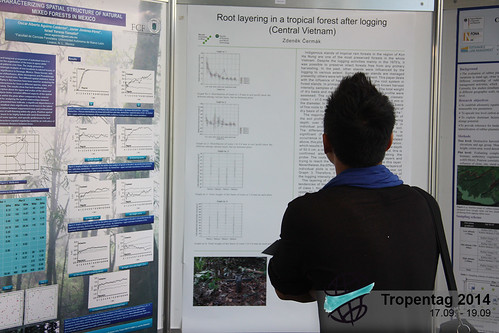 Conservation agriculture (CA)
Conservation agriculture (CA) has been advocated by many scientists as the solution for sustainable agricultural production. Indeed, finding of many research project support it and it can also be seen at Poster Sessions of Tropentag2014, where successful examples were given: applying no-tillage farming had a positive influence for Acrisols in Brazil, mulching application in Kenya provided better water retention or combination of technics increased yields in Mexico. However, a case study from R. Romero-Perezgrovas says, that on 6% of increase in soil fertility on the one hand, farmer would get 50% weeds in his field.
Another issue to discuss is the unemployment. Or rather why youth is not willing to work in agriculture. It is clear that agriculture, especially conservation or organic streams of it, is labor intensive sector. It requires great physical effort that is less common in other jobs nowadays. And at the same time, there are
74 mln people in the world who are unemployed that creates and opportunity for agricultural sector. The other thing is low income of an average farmer makes it to be not a "cool" job. This case was research by Carvalho Salviano on small milk farmers in Goias state of Brazil. Certain organizations like
CGIAR, YPARD and
various smaller initiatives try to interview young farmers and spread the word to change current perceptions.
When implementation of principles of conservation agriculture start to seem overall challenging and not easy to implement, than it is time for a contradictory research to cheer the mood up. Such convincing research results were presented by Katja Kehlenbeck and Monica Omondi. They have found 25 varieties of Mango in Kenya and among other finding it seems to be stunning that some of them are so rich on Vitamin A that can solve the problem of vitamin deficiency in the region. Just need a little help and coordination on the local level. That, to add the final remark, is one of the most widely discussed topis at Tropentag 2014.
 Conservation agriculture (CA) has been advocated by many scientists as the solution for sustainable agricultural production. Indeed, finding of many research project support it and it can also be seen at Poster Sessions of Tropentag2014, where successful examples were given: applying no-tillage farming had a positive influence for Acrisols in Brazil, mulching application in Kenya provided better water retention or combination of technics increased yields in Mexico. However, a case study from R. Romero-Perezgrovas says, that on 6% of increase in soil fertility on the one hand, farmer would get 50% weeds in his field.
Another issue to discuss is the unemployment. Or rather why youth is not willing to work in agriculture. It is clear that agriculture, especially conservation or organic streams of it, is labor intensive sector. It requires great physical effort that is less common in other jobs nowadays. And at the same time, there are 74 mln people in the world who are unemployed that creates and opportunity for agricultural sector. The other thing is low income of an average farmer makes it to be not a "cool" job. This case was research by Carvalho Salviano on small milk farmers in Goias state of Brazil. Certain organizations like CGIAR, YPARD and various smaller initiatives try to interview young farmers and spread the word to change current perceptions.
When implementation of principles of conservation agriculture start to seem overall challenging and not easy to implement, than it is time for a contradictory research to cheer the mood up. Such convincing research results were presented by Katja Kehlenbeck and Monica Omondi. They have found 25 varieties of Mango in Kenya and among other finding it seems to be stunning that some of them are so rich on Vitamin A that can solve the problem of vitamin deficiency in the region. Just need a little help and coordination on the local level. That, to add the final remark, is one of the most widely discussed topis at Tropentag 2014.
Conservation agriculture (CA) has been advocated by many scientists as the solution for sustainable agricultural production. Indeed, finding of many research project support it and it can also be seen at Poster Sessions of Tropentag2014, where successful examples were given: applying no-tillage farming had a positive influence for Acrisols in Brazil, mulching application in Kenya provided better water retention or combination of technics increased yields in Mexico. However, a case study from R. Romero-Perezgrovas says, that on 6% of increase in soil fertility on the one hand, farmer would get 50% weeds in his field.
Another issue to discuss is the unemployment. Or rather why youth is not willing to work in agriculture. It is clear that agriculture, especially conservation or organic streams of it, is labor intensive sector. It requires great physical effort that is less common in other jobs nowadays. And at the same time, there are 74 mln people in the world who are unemployed that creates and opportunity for agricultural sector. The other thing is low income of an average farmer makes it to be not a "cool" job. This case was research by Carvalho Salviano on small milk farmers in Goias state of Brazil. Certain organizations like CGIAR, YPARD and various smaller initiatives try to interview young farmers and spread the word to change current perceptions.
When implementation of principles of conservation agriculture start to seem overall challenging and not easy to implement, than it is time for a contradictory research to cheer the mood up. Such convincing research results were presented by Katja Kehlenbeck and Monica Omondi. They have found 25 varieties of Mango in Kenya and among other finding it seems to be stunning that some of them are so rich on Vitamin A that can solve the problem of vitamin deficiency in the region. Just need a little help and coordination on the local level. That, to add the final remark, is one of the most widely discussed topis at Tropentag 2014. 




Comments
Post new comment